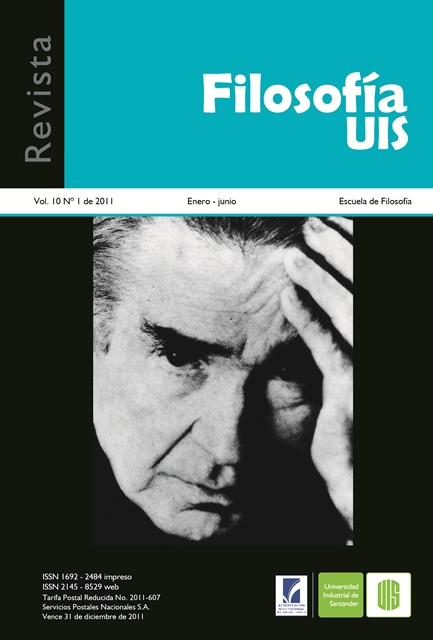Towards a just international order. Thomas Pogge's critique of the John Rawls’s law of peoples
Published 2011-07-15
Keywords
- Thomas W. Pogge,
- international justice,
- Law of Peoples,
- Theory of Justice,
- John Rawls
How to Cite
Copyright (c) 2011 Miguel Mandujano Estrada

This work is licensed under a Creative Commons Attribution 4.0 International License.
Abstract
In this paper, we present the critical assessment that Thomas W. Pogge makes ofthe Law of Peoples, extension of the John Rawls’s Theory of Justice to the international case.Pogge's arguments, a disciple of Rawls, are framed into the liberal tradition, but it shows thatit is possible to make an interpretation of Rawls' Theory of Justice from the perspective of aconception of global sensitive justice to social and economic inequalities of the world andto establish practical ways of social transformation.
Downloads
References
- Blake, Michael (2005). “International Justice”, En: Stanford Encyclopedia of Philosophy, http://plato.stanford.edu/entries/international-justice/ (visitado el 26 de noviembre de 2010).
- Follesdal, Andreas y Pogge, Thomas (eds.) (2005). Real World Justice. Grounds, Principles, Human Rights, and Social Institutions, Dordrecht: Springer.
- García, Mercedes y López, Diego (2000). Crimen internacional y jurisdicción universal, Valencia: Tirant lo Blanch.
- Pogge, Thomas (1983). Kant, Rawls, and Global Justice. Ph.D. dissertation, Cambridge: Harvard University.
- Pogge, Thomas (1989). Realizing Rawls, New York: Cornell University Press.
- Pogge, Thomas (1994). “An Egalitarian Law of Peoples”, En: Philosophy and Public Affairs. Vol. 23, No. 3, Princeton, New Yersey, Universidad de Princeton, pp. 195-224.
- Pogge, Thomas (2001). “Rawls on International Justice”, En: The Philosophical Quarterly. Vol. 51, No. 203, St. Andrews, RU, Universidad de St. Andrews, pp. 246-253.
- Pogge, Thomas (2004). “The Incoherence Between Rawls’s Theories of Justice”. Fordham Law Review. Vol. 72, No. 5, New York, Universidad de Fordham, pp. 1739-1759.
- Pogge, Thomas (2005). La pobreza en el mundo y los derechos humanos [2002], Barcelona: Paidós.
- Pogge, Thomas (2006). “Do Rawls’s Two Theories of Justice Fit Together?”, En: Martin, Rex y Reidy, David (eds). Rawls’s Law of Peoples. A realistic Utopia? Malden: Blackwell, pp. 206-225.
- Pogge, Thomas (2007). “¿Qué es la Justicia Global?”, En: Revista Latinoamericana de Filosofía. Vol. 33, No. 2, Buenos Aires, Centro de Investigaciones Filosóficas, pp. 181-203.
- Pogge, Thomas (2009). Hacer justicia a la humanidad, México: UNAM-Fondo de Cultura Económica.
- Rawls, John (1971). A Theory of Justice, Cambridge: Harvard University Press. Edición española de 1979. María Dolores González (trad.), México: Fondo de Cultura Económica.
- Rawls, John (1993a). Political Liberalism, New York: Columbia University Press. Edición española de 2004. Antonio Domènech (trad.), Barcelona: Crítica.
- Rawls, John (1993b). The Law of Peoples. Critical Inquiry. Vol. 20, No. 1, Chicago, Universidad de Chicago, pp. 36-68. Edición española de 1997, En: Isegoría, No. 16, Madrid, Instituto de Filosofía del Consejo Superior de Investigaciones Científicas, pp. 5-36.
- Rawls, John (1999). The Law of Peoples; with, The Idea of Public Reason Revisited, Cambridge: Harvard University Press. Edición española de 2001. Hernando Valencia Villa (trad.), Barcelona: Paidós.
- Rawls, John (2002). La justicia como equidad. Una reformulación [2001], Andrés de Francisco (trad.), Barcelona: Paidós.
- Santos, Boaventura de Sousa (2005). El milenio huérfano. Ensayos para una nueva cultura política, Madrid: Trotta.
- Vergés, Joan (2006). Les esquerdes del liberalisme polític. Una crítica filosòfica a Rawls, Barcelona: Pòrtic.
